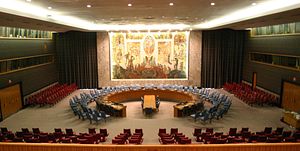On Monday, the United Nations Security Council (UNSC) unanimously adopted a new sanctions resolution against North Korea after the country carried out its sixth nuclear test earlier this month on September 3.
The new sanctions apply new restrictions to shipments of refined hydrocarbons to North Korea, placing a cap at two million barrels per year while leaving annual crude oil imports untouched.
The sanctions also place a ban on all textile exports from North Korea and notably restricts the activities of North Korean workers overseas. (The resolution contains some exceptions to North Korean overseas labor.)
The sanctions adopted on Monday build on UNSC resolution 2371, which was adopted in August in response to North Korea’s first-ever tests of an intercontinental-range ballistic missile in violation of UNSC resolutions.
According to the U.S. delegation to the United Nations, the ban on textile exports would restrict North Korean export revenues by $1.3 billion annually, adding to the estimated $1 billion in annual costs to the North Korean economy per resolution 2371.
That resolution banned the export of several important commodities, including lead, lead ore, iron, iron ore, coal, and seafood.
Prior to Monday’s vote, the United States had reportedly sought a more forceful resolution with a complete oil embargo on North Korea.
Facing opposition from China and Russia, the resolution was ultimately modified to allow oil exports to North Korea.
China and Russia voted in favor of the resolution, with their representatives calling for a return to diplomacy on the Korean peninsula to ultimately defuse the ongoing crisis.
Monday’s resolution also adds provisions to allow UN member states to interdict North Korean cargo vessels at sea “if they have information that provides reasonable grounds to believe that the cargo of such vessels” contains cargo prohibited for transfer to North Korea by previous UN Security Council resolutions.
These inspections would require the consent of the “flag State” of the vessel, per the resolution. Nevertheless, the resolution also calls on all UN member states to cooperate with these inspections.
The measure is intended to aid in the enforcement of existing sanctions resolutions, but does not allow for the use of force against noncompliant vessels.
North Korea’s sixth test was of a claimed hydrogen bomb and its largest to date, producing what the United States intelligence community estimates as 140 kilotons of TNT equivalent in explosive yield.

































